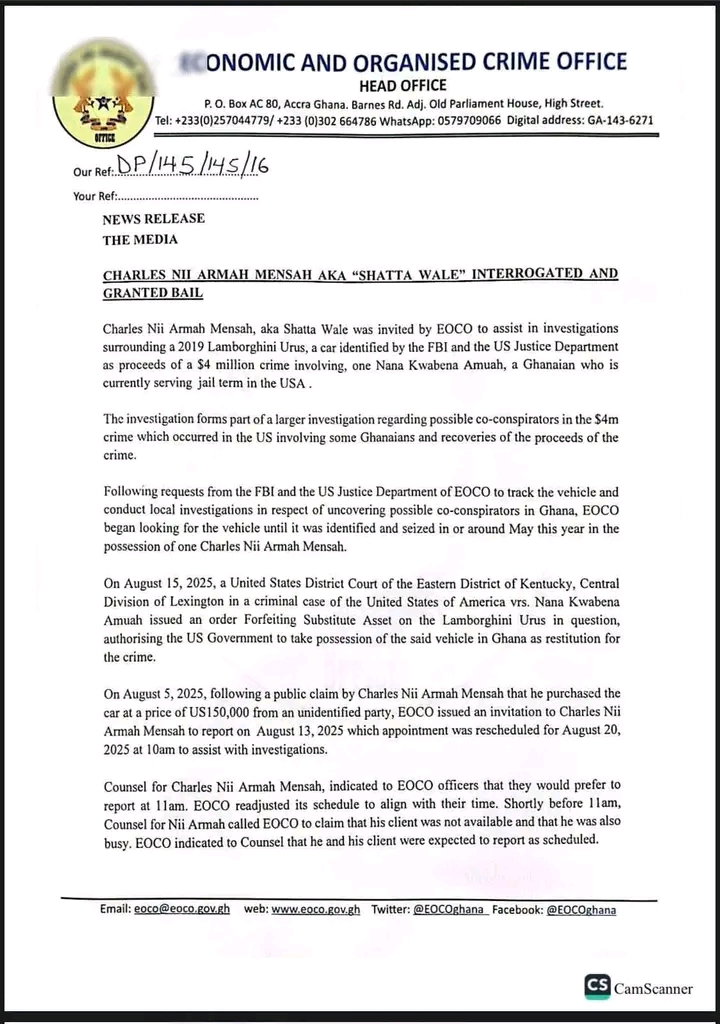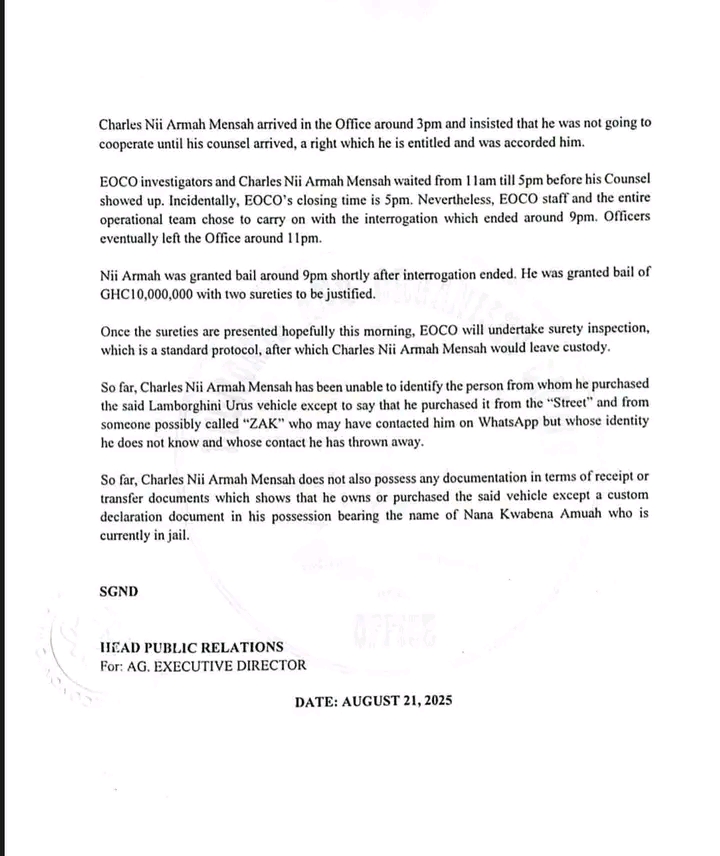Why Shatta Wale Could Be Jailed: EOCO investigation into FBI-tracked Lamborghini explained

GH News Media

Charles Nii Armah Mensah, popularly known as Shatta Wale, faces potential imprisonment under Ghana's stringent anti-money laundering laws following his interrogation by the Economic and Organised Crime Office (EOCO) regarding a 2019 Lamborghini Urus valued at approximately $150,000.
The vehicle has been identified by the FBI and US Justice Department as proceeds of a $4 million crime involving Nana Kwabena Amuah, a Ghanaian currently serving a prison sentence in the United States.
Background: The International Crime Connection
The case originates from a complex international fraud scheme that netted $4 million, orchestrated by Nana Kwabena Amuah, who is currently incarcerated in the United States. As part of this criminal enterprise, luxury assets, including the Lamborghini Urus in question, were acquired using the proceeds of the crime.
The Federal Bureau of Investigation (FBI) and the US Justice Department have been working systematically to trace and recover these assets as part of a broader investigation into possible co-conspirators in Ghana.
On August 15, 2025, the United States District Court of the Eastern District of Kentucky, Central Division of Lexington, issued a forfeiture order for the Lamborghini Urus, authorising the US Government to take possession of the vehicle in Ghana as restitution for the crime.
This court order represents a critical legal development that directly impacts Shatta Wale's possession of the vehicle.
EOCO's Investigation and Shatta Wale's Response
Following requests from US law enforcement agencies, EOCO launched a local investigation to track the vehicle and uncover possible co-conspirators in Ghana. The vehicle was identified and seized around May 2025 while in Shatta Wale's possession.
The investigation took a significant turn when Shatta Wale made a public claim on August 5, 2025, asserting that he had purchased the car for $150,000 from an unidentified party. This public statement prompted EOCO to formally invite him for questioning, initially scheduled for August 13, 2025, but later rescheduled to August 20, 2025.
The interrogation process itself revealed concerning patterns of behaviour. Shatta Wale arrived at EOCO's offices at 3:00 PM, three hours after the scheduled time, and insisted on waiting for his counsel.
While this is his legal right, the subsequent interrogation, which lasted from approximately 5:00 PM to 9:00 PM, extended well beyond EOCO's normal operating hours, demonstrating the seriousness of the investigation.
Critical Evidence Against Shatta Wale: Analysis of the Final Paragraphs
The final two paragraphs of the EOCO press statement contain the most damaging evidence against Shatta Wale, providing a compelling foundation for potential criminal charges:
Paragraph One: The Phantom Seller
"So far, Charles Nii Armah Mensah has been unable to identify the person from whom he purchased the said Lamborghini Urus vehicle except to say that he purchased it from the 'Street' and from someone possibly called 'ZAK' who may have contacted him on WhatsApp but whose identity he does not know and whose contact he has thrown away."
This statement reveals a pattern of evasive and implausible explanations that are characteristic of money laundering cases. Under Ghana's anti-money laundering framework, "a person commits an offence of money laundering if the person knows or ought to have known that property is or forms part of the proceeds of unlawful activity and the person converts, conceals, disguises or transfers the property" or "acquires, uses or takes possession of the property."
The claim of purchasing a $150,000 luxury vehicle from an unknown person called "ZAK" through WhatsApp contact that has been "thrown away" defies commercial logic and established business practices. No legitimate buyer of such a high-value asset would fail to:
Verify the seller's identity.
Retain contact information.
Conduct proper due diligence.
Maintain communication records.
This explanation suggests either wilful blindness or deliberate concealment of the true source of the vehicle, both of which constitute elements of money laundering under Ghanaian law.
Paragraph Two: The Documentation Deficit
"So far, Charles Nii Armah Mensah does not also possess any documentation in terms of receipt or transfer documents which shows that he owns or purchased the said vehicle except a customs declaration document in his possession bearing the name of Nana Kwabena Amuah, who is currently in jail."
This paragraph provides perhaps the most incriminating evidence. The absence of legitimate ownership documentation, combined with the possession of customs documentation bearing the name of the convicted criminal, creates a clear evidentiary trail linking Shatta Wale to the proceeds of crime.
The fact that the only documentation in his possession bears Nana Kwabena Amuah's name is particularly damaging because:
It directly connects him to the convicted criminal.
It contradicts his claim of purchasing from an unknown "ZAK".
It suggests he came into possession of the vehicle through the criminal enterprise.
It demonstrates knowledge of the vehicle's questionable provenance.


Legal Framework and Potential Charges
Money Laundering Offences
Under Ghana's Anti-Money Laundering Act 2020 (Act 1044), "an individual who commits money laundering is now liable on summary conviction to a fine not less than 100% and not more than 500% of the proceeds of the crime" along with imprisonment terms.
The elements of money laundering that may apply to Shatta Wale's case include:
Knowledge or Constructive Knowledge: The law requires that the accused "knows or ought to have known" that the property forms part of the proceeds of unlawful activity. The possession of customs documentation bearing a convicted criminal's name, combined with the implausible explanation of the purchase, suggests constructive knowledge at minimum.
Acquisition and Possession: Shatta Wale clearly acquired and took possession of the vehicle, which has been definitively identified as proceeds of crime by US authorities.
Concealment: His evasive explanations and inability to provide legitimate documentation suggest attempts to conceal the unlawful origin of the property.
Receiving Stolen Property
Beyond money laundering charges, Shatta Wale could face charges for receiving stolen property, particularly given his possession of a vehicle that has been legally determined to be proceeds of crime subject to forfeiture.
Potential Penalties and Imprisonment
The current legal framework imposes severe penalties, including "a fine not less than 100% and not more than 500% of the proceeds of the crime" for individuals convicted of money laundering. Given that the vehicle is valued at approximately $150,000, Shatta Wale could face fines ranging from $150,000 to $750,000 in addition to imprisonment.
The imprisonment terms for money laundering in Ghana can be substantial, particularly in cases involving high-value assets and international criminal enterprises. The severity of potential sentences reflects the serious nature of these crimes and their impact on Ghana's financial system and international reputation.
Prosecutorial Strategy and Evidential Strength
From a prosecutorial perspective, the case against Shatta Wale appears strong based on several factors:
Circumstantial Evidence Pattern
Possession of proceeds of a proven crime
Implausible explanation for acquisition
Lack of legitimate documentation
Possession of documentation linking him to the convicted criminal
Evasive behaviour during investigation
International Cooperation
The involvement of US law enforcement agencies and the federal court forfeiture order provide strong corroborative evidence of the vehicle's criminal origin, eliminating any doubt about whether the property constitutes proceeds of crime.
Documentary Evidence
The customs declaration bearing Nana Kwabena Amuah's name creates a direct evidential link between Shatta Wale and the criminal enterprise, undermining his defence of innocent purchase.
Legal Defences and Their Limitations
While Shatta Wale's legal team may attempt various defences, each faces significant challenges:
Innocent Purchase Defence
This defence would require proving legitimate acquisition from an unknown seller, which is undermined by:
The implausible nature of the claimed transaction
Absence of supporting documentation
Possession of documentation linking him to the criminal
Lack of Knowledge Defence
This defence would require demonstrating that he neither knew nor should have known about the criminal origin, which is complicated by:
The suspicious circumstances of the claimed purchase
His possession of customs documentation bearing the criminal's name
The high value of the asset and unusual transaction method
Conclusion and Risk Assessment
The final two paragraphs of the EOCO press statement provide compelling evidence for potential criminal charges against Shatta Wale. His inability to identify the seller, the implausible explanation of the transaction, and, most critically, his possession of customs documentation bearing the name of the convicted criminal create a strong evidentiary foundation for money laundering charges.
Under Ghana's anti-money laundering laws, the prosecution need only prove that he "knows or ought to have known that property is or forms part of the proceeds of unlawful activity" and that he acquired or possessed such property. The circumstances described in the EOCO statement appear to satisfy both elements.
Given the strength of the evidence, the international dimension of the case, and Ghana's commitment to combating money laundering and economic crimes, Shatta Wale faces a significant risk of prosecution and potential imprisonment. The case serves as a stark reminder that Ghana's anti-money laundering framework, supported by international cooperation through agencies like EOCO, will pursue all individuals involved in criminal enterprises, regardless of their public profile or status.
The outcome of this case will likely depend on Shatta Wale's ability to provide credible evidence of legitimate acquisition and ownership, which appears challenging given the current evidence against him. As the investigation continues, the entertainment industry and the public will be watching closely to see how Ghana's justice system handles this high-profile case involving proceeds of international crime.
This analysis is based on publicly available information from the EOCO press statement dated August 21, 2025, and Ghana's anti-money laundering legal framework. The case remains under investigation, and all individuals are presumed innocent until proven guilty in a court of law.



